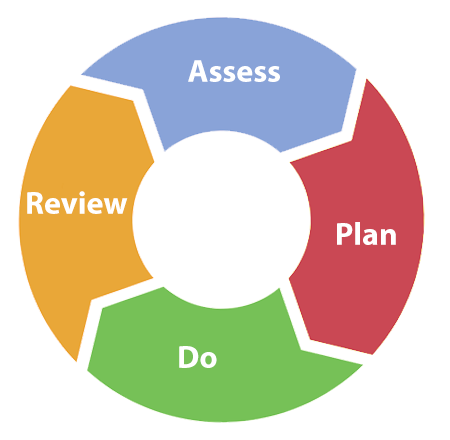Still too much testing in schools?
By: Grace Evans on Oct 22, 2024 2:37:29 PM
7 min read

It’s a common complaint from students, teachers, the press, and even the odd politician: there’s just too much testing in schools.
Following the recent release of OCR’s report, Striking the balance: A review of 11-16 curriculum and assessment in England, chaired by Charles Clarke, we thought it was time to revisit this idea.
In 2020, at the height of the pandemic, we saw just how important testing is in schools. The whole education system is based on, and leads to, 16 and 18 year-olds sitting exams to gain the qualifications that complete their statutory education. When sitting an exam was not an option, the challenges to present an alternative highlighted how much we rely on assessment to provide an independent, objective, fair and consistent measure of learning.
“What is actually taught in schools is obviously very much dependent on the assessment regime which is in place. This is because assessment outcomes are the central means by which students themselves, their families, schools and teachers are held accountable for their success.”
Charles Clarke, former UK Education Secretary
So, assessment is crucial. But, what is striking is that one of the four areas the review focuses on is ‘Reducing the overall burden of assessment’.
A test by any other name...
The assessment burden does not just refer to the end-of-year exams like GCSE, IGCSE or A Level, but includes all the assessments that are administered throughout the year.
What is the difference between an exam and an assessment? What is a ‘non-exam assessment’? Is it the same as a test? What about mocks? Why isn’t a test an exam if it is an assessment?
The language we use around testing is confusing. Especially when we tend to use these words seemingly interchangeably. There are some distinctions to bear in mind.
So for clarification:
- Test – the questions on the paper or the activity in front of you to find out what you know or can do. This is probably the most ambiguous term as it can range from a 5-minute Year 2 informal spelling test to an hour-long controlled practical experiment for GCSE Chemistry.
- Exam (examinations) – these usually refer to the high-stakes formal end-of-course tests like GCSEs, IGCSEs, A Levels or the IB. Essentially, students are allocated a grade, level or standard as an evaluation of their achievement. This is also known as summative assessment.
- Assessment – very similar to testing but there is an element of judging involved. Formative assessment, or Assessment for Learning, is using and interpreting evidence for students and their teachers to decide where they are in their learning, where they need to go and how best to get there.
- Baseline assessment – this is a snapshot of a student’s ability at the time they take the test, usually the beginning of the academic year. The assessment results provide information such as their current strengths and weaknesses in specific areas, as well as possible outcomes for their exams.
Teachers can use tests to assess how students may perform in their exams.
Is this really the best use of testing in schools?
Teaching to the test?
Charles Clarke puts it plainly: “The principle beneficiaries of any assessment regime ought to be the pupils themselves”.
If the test is not helping the student in any way, why are they doing it? The idea of exam results as an accountability measure for schools causes friction with the assessment for learning ideal.
‘Teaching to the test’ has become a common phrase and suggests a focus on exam outcomes to the detriment of wider learning or contextual understanding. Coaching students to answer the 4-mark or 8-mark question through repeated past paper practice or mock exams, rather than cementing an understanding or appreciation of the subject
Or, as the assessment and curriculum review states: “the volume of school time and energy which is taken up by current assessment regimes reduces the time available for teaching and learning and so can inhibit the space for creative activity within the school day”.
Exam preparation is necessary as long as it remains the way we measure student success. We all want our students to perform well and not be thrown by whatever appears on the paper – but there’s a fine line between preparing and coaching.
OCR’s review has found that ‘the volume of assessment and size of the curriculum can be reduced without reducing the integrity of exams, or the value of the qualification’.
The crucial point remains that education is not about exams.
In 2020, Tim Oates, Group Director for Assessment Research and Development, noted in a Westminster Education Forum that ‘much more assessment’ of the ‘right kind’ is needed. This is the assessment for learning, or where the learner is at the centre of the assessment system rather than the assessments themselves. Schools need to show that their teaching and learning goes beyond exams.
The recommendations from the 2024 review also highlight the need for balance and spreading the intensity of exams across Key Stage 4. One possible way for this future of assessment in schools is to integrate more digital assessment and learning into the curriculum.
No matter what happens, teachers assess their learners every day in every lesson. How else can you know if your student has understood what you’ve taught them other than by asking them questions? As Tim Oates also said there is ‘nothing as good as a good question.’
Whether the question is asked verbally or written down as a traditional test, it is still a form of assessment that is helping teachers understand where their students are and where they need to go next.
So, is there too much testing in schools? Yes. Even an exam board says so! But assessment is a vital and necessary part of the learning process.
Establishing a complete assessment cycle and understanding the purpose behind each assessment can go a long way to managing the assessment burden.
Assessment, done right, is an equal part of the teaching and learning cycle, supporting teachers to structure their approach to have the greatest impact on their students.

What does make a good assessment?
Watch one of our recorded webinars: How the right assessment strategy can benefit your school
Related Posts
5 Steps to make assessment work for you
"To be able to evaluate impact, we need to know where we are starting from. For this we need...
A complete and effective assessment cycle
Assessments are a vital part of school life. There are many different types of assessments, they...
Quality check: are your assessments giving you the best data?
Schools need to be able to trust that the assessment data they have is reliable and robust. But how...

